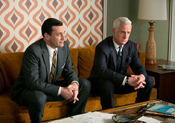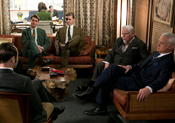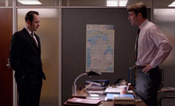Mad Men is at its most compelling when the action is focused on the agency and Don Draper. “The Quality of Mercy” does just  that as the penultimate episode of season six. Far from merciful, it is an episode about suffering and the killing of relationships. Don sinks even deeper into an abyss of despair and his torments are powerful opening and closing bookends for the episode. “The Quality of Mercy” opens on Don sleeping off another drunken day and wallowing in his guilt over Sally catching him “comforting” Sylvia in the bedroom. It closes on Don curled up on his office couch after absorbing the gut wrenching rejection and disdain delivered by Peggy. On Don’s relentless march to ruin everything he touches, he loses the connection to the only two females he seems to listen to and really care about. Both Sally and Peggy have run out of mercy for Don. The détente at the office is short lived as Don seizes the opportunity to humiliate Ted and reassert his control over Peggy in a particularly hurtful and sadistic manner. Pete, on the other hand, puts aside his disdain for Bob Benson in order to seize an opportunity on Chevy and regain his relevance.
that as the penultimate episode of season six. Far from merciful, it is an episode about suffering and the killing of relationships. Don sinks even deeper into an abyss of despair and his torments are powerful opening and closing bookends for the episode. “The Quality of Mercy” opens on Don sleeping off another drunken day and wallowing in his guilt over Sally catching him “comforting” Sylvia in the bedroom. It closes on Don curled up on his office couch after absorbing the gut wrenching rejection and disdain delivered by Peggy. On Don’s relentless march to ruin everything he touches, he loses the connection to the only two females he seems to listen to and really care about. Both Sally and Peggy have run out of mercy for Don. The détente at the office is short lived as Don seizes the opportunity to humiliate Ted and reassert his control over Peggy in a particularly hurtful and sadistic manner. Pete, on the other hand, puts aside his disdain for Bob Benson in order to seize an opportunity on Chevy and regain his relevance.
This Account Is Killing Me
As the lead account person on Chevy, Ken Cosgrove has a big responsibility and a difficult job. He spends most of his time away from home in Detroit dealing with demanding, boorish, gun loving clients. The Chevy account drives the financial health of the agency. It is a prestige account on which careers can be made or broken. The account has had its ups and downs at the agency. Ted Chaough stepped in to break the creative strategy logjam and then Don put the agency’s foot in its mouth trying to get a deferment for Mitchell Rosen.
The loss of Chevy, for any reason, would be devastating to SC&P. Pete Campbell has been lusting after the opportunity to work on the account and he finally gets the opening when Ken returns from another near brush with death at the hands of the  client. A very flustered Ken lets Pete know that his wife is pregnant and asks off the account. Pete rightly cautions Ken that this could be a very bad career move and then offers to step in and fill the vacuum. This is Pete’s opportunity to directly tie himself to substantial revenue and get relief from his miserable bachelor pad existence in New York City. Pete also tries to use this as an opportunity to move Bob Benson out of the picture but he encounters push back from the partners. Pete’s plea to build his own team sans Bob Benson is reasonable. As the lead account person Pete wants a team he can trust. Bert Cooper and Jim Cutler flatly reject Pete’s demand. “I like Bob. Chevy likes Bob. And if you don’t like Bob, we can find someone who does,” Jim Cutler tells Pete. They finally agree that Pete will take over the outside role in Detroit assisted by Bob and that Ken will stay on as the inside man at the agency. Jim’s argument that continuity of the account team is critical is spot on. Clients, especially automotive accounts, do not like disruptions in their account relationships and changes must be carefully managed. The new line-up enables SC&P to maintain continuity and even announce an increase in staffing using Ken’s impending fatherhood as cover. A good move provided Pete can handle the pressure in Detroit.
client. A very flustered Ken lets Pete know that his wife is pregnant and asks off the account. Pete rightly cautions Ken that this could be a very bad career move and then offers to step in and fill the vacuum. This is Pete’s opportunity to directly tie himself to substantial revenue and get relief from his miserable bachelor pad existence in New York City. Pete also tries to use this as an opportunity to move Bob Benson out of the picture but he encounters push back from the partners. Pete’s plea to build his own team sans Bob Benson is reasonable. As the lead account person Pete wants a team he can trust. Bert Cooper and Jim Cutler flatly reject Pete’s demand. “I like Bob. Chevy likes Bob. And if you don’t like Bob, we can find someone who does,” Jim Cutler tells Pete. They finally agree that Pete will take over the outside role in Detroit assisted by Bob and that Ken will stay on as the inside man at the agency. Jim’s argument that continuity of the account team is critical is spot on. Clients, especially automotive accounts, do not like disruptions in their account relationships and changes must be carefully managed. The new line-up enables SC&P to maintain continuity and even announce an increase in staffing using Ken’s impending fatherhood as cover. A good move provided Pete can handle the pressure in Detroit.
Pete’s Teachable Moment
After agreeing to Jim and Bert’s demands to keep Bob on Chevy, Pete secretly sets out to find a way to have Bob Benson exit the agency gracefully. In the process we finally get a look under the covers of Bob Benson’s façade and witness the more practical, savvy side of Pete. Troubled that Bob’s knee-rubbing romantic advances would ultimately be a problem on Chevy, Pete reaches out to his headhunter friend, Duck Phillips, to turn up some attractive leads that might entice Bob to leave SC&P. It turns out that Bob’s Wharton education, blue-blood connections and top shelf agency experience at K&E and Cunningham & Walsh (two large, well respected Madison Avenue agencies) are all shams. In fact, Bob is a wrong side of the tracks, West Virginia version of Don Draper…an invented persona. When Duck tells Pete, “I’ve never seen anything like this before,” Pete responds, “ I Have.”
savvy side of Pete. Troubled that Bob’s knee-rubbing romantic advances would ultimately be a problem on Chevy, Pete reaches out to his headhunter friend, Duck Phillips, to turn up some attractive leads that might entice Bob to leave SC&P. It turns out that Bob’s Wharton education, blue-blood connections and top shelf agency experience at K&E and Cunningham & Walsh (two large, well respected Madison Avenue agencies) are all shams. In fact, Bob is a wrong side of the tracks, West Virginia version of Don Draper…an invented persona. When Duck tells Pete, “I’ve never seen anything like this before,” Pete responds, “ I Have.”
Expedient hiring practices often replaced rigorous checking of resumes in the Mad Men days. Bob was hired at SC&P after a brief interview with Ken and an on the spot OK by Pete. In his early days at SC&P, Pete would have relished the idea of “outing” the “real” Bob Benson to the partners. It looks like Pete has learned from his failed attempt to reveal Don’s true identity that backfired on him. The new, more pragmatic Pete shows a bit of self-serving mercy towards Bob. Pete confronts Bob by telling him what he knows and announcing his own détente. “You’re going to get the benefit of the fact that I’ve been here before,” Pete says, “I surrender.” Pete resigns himself to the fact that, despite his education, pedigree and experience, going against Bob (as it was with Don) would be a loosing battle. Pete’s two conditions to Bob are that he is “off limits” and to get Manolo out of his mother’s life.
The Juice Wars Resume
The détente Don arranged with Ted blows up with substantial collateral damage. Initially, Don is being true to his word when  he tells Harry to drop Sunkist because it conflicts with Ocean Spray. The fact that Harry continues to have discussions with Sunkist without the knowledge of the partners is a manifestation of the ongoing dysfunction at the agency. Emboldened by his movie theater encounter with Ted and Peggy, Don returns to his controlling ways. His first act is to rescind his directive to Harry to back out of Sunkist. He and Roger meet with Ted and Jim and lay out the juicy Sunkist scenario. The opportunity to trade a much smaller Ocean Spray for an eight million dollar Sunkist, eager to make a big television splash with color commercials.
he tells Harry to drop Sunkist because it conflicts with Ocean Spray. The fact that Harry continues to have discussions with Sunkist without the knowledge of the partners is a manifestation of the ongoing dysfunction at the agency. Emboldened by his movie theater encounter with Ted and Peggy, Don returns to his controlling ways. His first act is to rescind his directive to Harry to back out of Sunkist. He and Roger meet with Ted and Jim and lay out the juicy Sunkist scenario. The opportunity to trade a much smaller Ocean Spray for an eight million dollar Sunkist, eager to make a big television splash with color commercials.
Agencies are often put in the position of having to decide between commitments to existing clients and the promise of larger revenues with a competitor. It is more than revenue that is at stake. Not handled correctly, resigning a smaller client for bigger one can badly tarnish an agency’s reputation with potential clients. Clients may not always be loyal to their agencies, but they demand loyalty and integrity from their agencies. In earlier episodes Don resisted the idea of trading Mohawk Airlines to pitch a larger American Airlines. Then there was the ill-fated decision to secretly pitch the Heinz Ketchup account risking the agency’s Heinz beans business. Don’s initial “stick with the one that brought you” reaction was overshadowed by the allure of a big spending brand that ended in disaster.
Ted declares that they’re already “a month into Ocean Spray,” and he is justifiably upset and correct in raising the caution flags with his partners. His resistance is quickly broken down by Jim’s embracing of Roger’s bigger is better argument and, once again, dollars trump honoring one’s word and loyalty. They all agree (again) that the agency must have a more cohesive, collaborative approach to new business but Ted is stuck making the tough, “knife in the back” call to Ocean Spray. He suggests that Peggy be on the account and Don agrees. A win-win for Don. He’s one-upped Ted and will get to supervise Peggy’s creative work on Sunkist.
Aspirin Brings On A Big Headache
Creating a new campaign for St. Joseph’s aspirin starts out as an exciting opportunity for Peggy. She is working closely (albeit  a bit too close) with Ted on a potentially award winning commercial based on Rosemary’s Baby. Agency creatives covet the fame and fortune that Clios and Cannes Lions can bring. These awards can catapult careers and agency fortunes so the prospect of an award winning television spot is a big dream for Peggy. She’s already experienced the let down of having the credit for her award-winning Glo-Coat ad coopted by Don. Peggy is confident that Ted would not do the same on St. Joseph’s. Ted and Peggy’s affection for each other is open and obvious to everyone in the office and it shines through when they act out the Rosemary’s Baby commercial with Don and Joan. In addition to being upset with their relationship, Don also realizes that the commercial will be very expensive to produce, possibly costing $50,000. (Today the average cost to produce a 30-second commercial is around $300,000.) Joan confirms Don’s fears when she reveals that the approved production budget is $15,000, which means the agency could be on the hook for up to $35,000 in overages.
a bit too close) with Ted on a potentially award winning commercial based on Rosemary’s Baby. Agency creatives covet the fame and fortune that Clios and Cannes Lions can bring. These awards can catapult careers and agency fortunes so the prospect of an award winning television spot is a big dream for Peggy. She’s already experienced the let down of having the credit for her award-winning Glo-Coat ad coopted by Don. Peggy is confident that Ted would not do the same on St. Joseph’s. Ted and Peggy’s affection for each other is open and obvious to everyone in the office and it shines through when they act out the Rosemary’s Baby commercial with Don and Joan. In addition to being upset with their relationship, Don also realizes that the commercial will be very expensive to produce, possibly costing $50,000. (Today the average cost to produce a 30-second commercial is around $300,000.) Joan confirms Don’s fears when she reveals that the approved production budget is $15,000, which means the agency could be on the hook for up to $35,000 in overages.
Commercial production costs have always been an issue with agencies and clients. They were very much on the radar in 1968 as the use of color television commercials was growing and talent was demanding higher residuals. Benton & Bowles, the agency at which I worked, formed a television production department focused on managing these costs and diffusing client issues. When I arrived at DDB in 1970 the agency had recently formed an in-house television production company with the same objective in mind.
Although Don’s desire to protect the agency from financial liability is correct, the way he handles it is far from well  intentioned or proper. Don goes around Ted and tells Joan to flag the production budget issues with the client. A surprised Ted tells Don that St. Joseph’s halted casting when they learned of the increased budget and that Peggy has her heart set on the ad: “She can smell the Clio.” Don agrees to back Ted up. The next day at the client meeting, Ted does his best to convince Byron, the St. Joseph’s client, to accept the new budget. He refuses to budge saying that when the company saw the commercial budget he got reamed out by “Mr. Plough.” (St. Joseph was owned by Schering Plough so if it caught the attention of the CEO, it was very serious.) Don steps in to save the day saying that the commercial is deeply personal to Ted, dangling the prospect of publicly revealing Ted’s affections for Peggy as the reason for his passion for the commercial. Don is unmerciful in the way he drags it out making Ted twitch and sweat before saying that the spot was Frank Gleason’s last idea. The client agrees to increase the budget to $25,000.
intentioned or proper. Don goes around Ted and tells Joan to flag the production budget issues with the client. A surprised Ted tells Don that St. Joseph’s halted casting when they learned of the increased budget and that Peggy has her heart set on the ad: “She can smell the Clio.” Don agrees to back Ted up. The next day at the client meeting, Ted does his best to convince Byron, the St. Joseph’s client, to accept the new budget. He refuses to budge saying that when the company saw the commercial budget he got reamed out by “Mr. Plough.” (St. Joseph was owned by Schering Plough so if it caught the attention of the CEO, it was very serious.) Don steps in to save the day saying that the commercial is deeply personal to Ted, dangling the prospect of publicly revealing Ted’s affections for Peggy as the reason for his passion for the commercial. Don is unmerciful in the way he drags it out making Ted twitch and sweat before saying that the spot was Frank Gleason’s last idea. The client agrees to increase the budget to $25,000.
This is Don Draper at his most mean spirited. He betrayed his partner, Ted, and killed any chance for Peggy’s recognition for  an award. If the St. Joseph’s commercial does get produced and win awards it will be Frank Gleason’s name on the credits. Don of course rationalizes his despicable behavior by saying, “I’m just looking out for the agency.” Later Don chastises Ted for being in love with Peggy and letting that impair his judgment: “I know your little girl has beautiful eyes but that doesn’t mean you give her everything. “True to form, Don lets his ego and insatiable desire for control get the better of sound business judgment. His feeling of victory is brief as Peggy storms into his office and calls Don out for his hypocrisy and cruelty. She tells Don what he probably knows about himself but refuses to admit. “You killed him. You killed the ad. You killed everything. You’re a monster.” Once again, her former mentor victimizes Peggy.
an award. If the St. Joseph’s commercial does get produced and win awards it will be Frank Gleason’s name on the credits. Don of course rationalizes his despicable behavior by saying, “I’m just looking out for the agency.” Later Don chastises Ted for being in love with Peggy and letting that impair his judgment: “I know your little girl has beautiful eyes but that doesn’t mean you give her everything. “True to form, Don lets his ego and insatiable desire for control get the better of sound business judgment. His feeling of victory is brief as Peggy storms into his office and calls Don out for his hypocrisy and cruelty. She tells Don what he probably knows about himself but refuses to admit. “You killed him. You killed the ad. You killed everything. You’re a monster.” Once again, her former mentor victimizes Peggy.
Finally, in keeping with Mad Men’s attention to detail and connecting the dots, it’s interesting to note that in a prior episode Sally was reading the book Rosemary’s Baby. And to further fuel the Sharon Tate conspiracy theorists, the film Rosemary’s Baby was directed by Roman Polanski, the husband of Sharon Tate. Matthew Weiner has assured Mad Men fans that Megan would not suffer Sharon Tate’s fate this season so we’re not likely to witness her passing in the finale episode. Next season, however, will be ripe with possibilities and finalities
